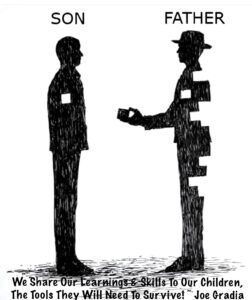 Being prepared for whatever life throws at you involves a mix of mindset, skills, and habits. Here are some strategies to help you stay ready:
Being prepared for whatever life throws at you involves a mix of mindset, skills, and habits. Here are some strategies to help you stay ready:
Stay Flexible: Embrace change and be willing to adapt. Flexibility allows you to handle unexpected situations more effectively.
Continuous Learning: Keep learning new skills and gaining knowledge. This can make you more adaptable and resourceful.
Build Resilience: Develop mental and emotional resilience. Practices like mindfulness, meditation, and regular exercise can help you stay calm and focused under pressure.
Plan and Prioritize: While you can’t predict everything, having a plan and knowing your priorities can help you navigate challenges more smoothly.
Stay Connected: Maintain a strong support network. Friends, family, and colleagues can provide advice, support, and different perspectives.
Practice Problem-Solving: Enhance your problem-solving skills by tackling small challenges regularly. This can build your confidence and ability to handle bigger issues.
Stay Positive: Cultivate a positive mindset. Optimism can help you see opportunities in challenges and keep you motivated.
Take Care of Yourself: Ensure you’re physically and mentally healthy. Good health is the foundation for handling stress and challenges effectively and stay focused always.~ Joe Gradia
How To Overcome Your Fears !
 Overcoming fear to shape your future is a journey, but here are some steps that might help:
Overcoming fear to shape your future is a journey, but here are some steps that might help:
Acknowledge Your Fear: Recognize what you’re afraid of and why. Understanding the root of your fear is the first step in overcoming it.
Set Small Goals: Break down your larger goals into smaller, manageable steps. Achieving these smaller goals can build your confidence and reduce fear.
Positive Mindset: Focus on positive outcomes and visualize success. This can help shift your mindset from fear to possibility.
Seek Support: Talk to friends, family, or a mentor. Sometimes, sharing your fears can make them seem less daunting.
Educate Yourself: Knowledge can reduce fear. The more you know about what you’re facing, the less intimidating it can become.
Take Action: Sometimes, the best way to overcome fear is to face it head-on. Taking action, even if it’s small, can help diminish fear over time.
Practice Self-Compassion: Be kind to yourself. Understand that it’s okay to feel fear, but it doesn’t have to control your decisions. ~ Joe Gradia
Share Your Wealth Of Knowledge To You Loved Ones!
 Passing on your skills and knowledge to your children and loved ones is a wonderful way to help them grow and succeed. Here are some tips to make this process effective and enjoyable:
Passing on your skills and knowledge to your children and loved ones is a wonderful way to help them grow and succeed. Here are some tips to make this process effective and enjoyable:
Lead by example: Children often learn by observing. Demonstrate the skills and values you want to pass on.
Make it interactive: Engage them in hands-on activities where they can practice and apply what they’re learning.
Be patient and encouraging: Learning new skills can be challenging. Offer support and celebrate their progress.
Share stories and experiences: Personal anecdotes can make lessons more relatable and memorable.
Encourage curiosity: Foster a love for learning by encouraging them to ask questions and explore new interests.
Create a positive learning environment: Ensure that learning is fun and stress-free. ~ Joe Gradia
The Power Of Prayer 🙏
 The power of prayer is often seen as a source of comfort, strength, and guidance. Many people find that prayer helps them to:
The power of prayer is often seen as a source of comfort, strength, and guidance. Many people find that prayer helps them to:
Find peace: It can be a way to calm the mind and reduce stress.
Seek guidance: Prayer can provide clarity and direction during difficult decisions.
Feel connected: It fosters a sense of connection to a higher power or to a community of believers.
Express gratitude: It offers a moment to reflect on and appreciate the positive aspects of life.
Build resilience: Regular prayer can help build mental and emotional strength to face life’s challenges. ~ Joe Gradia
Can vs Can’t 🤔
 The words “can” vs “can’t” are opposites and are used to express ability or possibility.
The words “can” vs “can’t” are opposites and are used to express ability or possibility.
Can: This word indicates that something is possible or that someone has the ability to do something. For example, “I can swim” means you have the ability to swim.
Can’t: This is a contraction of “cannot” and indicates that something is not possible or that someone does not have the ability to do something. For example, “I can’t swim” means you do not have the ability to swim.
The power of your subconscious mind change can change the way you look at things and the strength to push positively forward .
“Change the way you look at things and the things you look at will CHANGE!”~ Joe Gradia